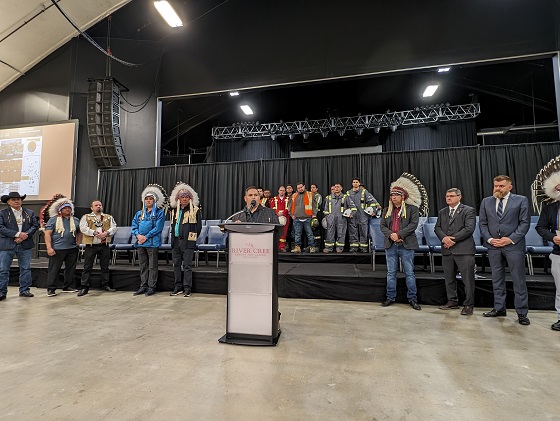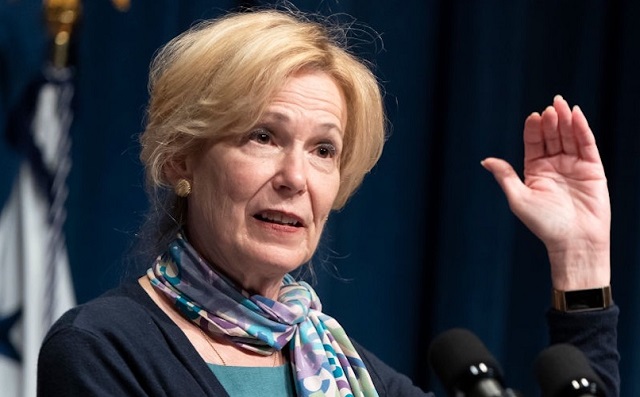Alberta
Alberta Chiefs demand Ottawa return funding for orphan well clean up

News release from Dennis Burnside, VP & Indigenous Practice Lead, Political Intelligence
Alberta Chiefs and the IRC call on Federal Government to fulfill its environmental obligations and commitments by releasing funding to First Nations
Government of Canada seeking to return $135 million in previously committed funding to federal coffers to use as savings, instead of empowering First Nations to clean up inactive and orphan wells on their lands.
ENOCH CREE NATION, AB, March 11, 2024
Chief Cody Thomas, Enoch Cree Nation, Chief Roy Whitney, Tsuut’ina Nation, and Chief Ivan Sawan, Loon River First Nation, joined with Chiefs from across Alberta today to call on the Federal Government to release unspent funding committed to the Site Rehabilitation Program (SRP) – approximately $135 million –to be utilized by Indigenous people to reclaim additional inactive and orphan wells on their lands. These funds are still in Alberta, but Ottawa is demanding them back.
On December 12, 2023, Chiefs from Treaty 6, Treaty 7, and Treaty 8 territories wrote to Minister Jonathan Wilkinson appealing to the federal government to allow the government of Alberta to place unspent SRP monies into the FNSR Program, providing much needed funding to continue the successful work that has been accomplished by First Nations, for First Nations. Without these funds, governments and industry would be leaving over 2,000 sites to be abandoned or reclaimed on First Nations lands and territories.
Chief Thomas stated: “We still have many inactive wells on our lands that need to be reclaimed properly; we estimate nearly 2,000 sites which will cost over $225 million. We acknowledge the work that has been done under the SRP but there is more to be done. This is a liability of the lessees, and the Alberta Government is holding them accountable through the Well Closure Program. However, time is not on our side. We have a very limited land base and a growing population. We must do the necessary land stewardship immediately”.
Chief Ivan Sawan stated: “Many Alberta First Nations have felt the greatest impacts of natural resource developments which have swept through our lands and ancestral territories for generations, leaving behind environmental wreckage, while being deprived of the opportunity to meaningfully participate or benefit. We are calling on the federal government to do the right thing and release these funds for the environmental and economic purposes they were intended, so that First Nations can create meaningful job opportunities, clean up our lands, and create a healthier and more prosperous future for our people.”
Chief Roy Whitney stated: “Too many oil and gas companies have simply walked away from their obligation to remediate their well sites on First Nation Lands. The SRP was a way for First Nations to have abandoned sites reclaimed. Accordingly, it was with great disappointment when we learned that the Federal Government was not going to release the remaining funds for the SRP. We fully support the request for the remaining funds being held to be released to continue the work to clean up our Lands.”
Under the previous Alberta Site Rehabilitation Program (ASRP) $130 million was allocated to 32 Alberta First Nations and Metis communities to clean up 2,145 sites. First Nations were able to abandon 988 wells and 411 km of pipelines as well as complete 793 reclamations while working on 4,188 projects. The result was a reduction of over $123 million in liability on reserves in Alberta while creating jobs, business development and training, and improving Indigenous community engagement and capacity.
The Indian Resource Council, an advocacy group that negotiated the set aside funding for First Nations, has detailed data on inactive and orphan wells on Indigenous lands. Stephen Buffalo, President and CEO of the IRC stated that the Federal regulator, IOGC, dropped the ball by failing to hold companies liable for their liabilities. He stated that First Nations can no longer depend on IOGC to get this work done.
Mr. Buffalo added: “Under Alberta’s SRP program, the government allocated more than $130 million for cleanup projects for First Nations and the Metis. So, we are doing what we can to keep that program going to maintain the success of the initial FNSRP. About 350 community members received jobs and skills training. By removing the aging wells and pipelines we can free up land to use for housing and other purposes” This is why we need the surplus funds.

A sign, from Alberta’s Orphan Well Association (OWA), identifies a non-producing and abandoned oil well near Carseland, Alberta on Sunday, July 21, 2019. Orphan wells do not have parties responsible for decommissioning or reclamation activities. THE CANADIAN PRESS IMAGES/Larry MacDougal
When SRP funding was earmarked to support Indigenous-led projects in 2021, it was celebrated that this was an area where the federal and provincial governments were in “perfect alignment”. This spirit of collaboration was good news for the environment, for Canada’s fight against climate change, and for First Nations. Alberta Chiefs are continuing to call on the federal government to rekindle this spirit of collaboration, however, Minister Wilkinson has recently stated that the federal government has “no plans to provide additional funding for the clean-
up of inactive and orphan wells.”
Alberta
Province announces next step to revamped health care system

Setting the foundation for a refocused health system
Proposed legislation would support the refocusing of Alberta’s health care system to ensure Albertans get the care they need when and where they need it.
On Nov. 8, 2023, Alberta’s government announced plans for a refocused health care system to ensure patients are receiving the care they need, when and where they need it. To achieve this, Alberta’s government will be creating four new organizations, one for each priority health services sector: acute care, primary care, continuing care and mental health and addiction.
If passed, the Health Statutes Amendment Act would enable the government to take the necessary next steps to refocus the province’s health care system. The legislation would ensure Albertans have a system that works for them by prioritizing their need to find a primary care provider, receive urgent care without long waits, have access to the best continuing care options and obtain excellent mental health and addiction treatment.
“We are taking another step toward improving health care by updating legislation and enabling the governance and oversight required to refocus the health system. The critical improvements to transparency and accountability will help support the successful refocusing of the health care system to one that is responsive, effective and reflects the needs and priorities of Albertans today and for future generations.”
The Health Statutes Amendment Act will enable the transition from one regional health authority, Alberta Health Services, to an integrated system of four sector-based provincial health agencies including primary care, acute care, continuing care and mental health and addiction. The agencies will be responsible for delivering integrated health services, ensuring Albertans receive timely access to care, regardless of where they live.
The Health Statutes Amendment Act establishes roles for an oversight minister and sector minister. The Minister of Health will take on the role of oversight minister, responsible for setting the strategic direction of the overall health system. A sector minister will be responsible for a specific health services sector. For example, the sector minister for Recovery Alberta is the Minister of Mental Health and Addiction. On the recommendation of the oversight minister, additional health service sectors may be established and designate a minister responsible for that newly created sector.
Enhanced government oversight will help Alberta’s government to better direct resources to the front lines where they are needed the most, improve patient care overall and support health care professionals.
“Mental health and addiction have been growing issues within our society and need to be prioritized within our health care system. Amid an addiction crisis, a refocused health system will allow for mental health and addiction services to get the attention, oversight and focus they need. Recovery Alberta would allow for improved mental health and addiction care across the province as an important part of an integrated health system.”
“Refocusing Alberta’s healthcare system is a crucial step towards ensuring that we can deliver a framework that prioritizes accessibility, accountability, and patient-centered care. By streamlining operations, improving oversight and fostering collaboration, we are setting a strong foundation for a healthcare system that is better equipped to address the diverse needs of each of our communities.”
The legislation will enable the minister of health to transfer employees or classes of employees from AHS to the new sector-based organizations, once established. During the transition period, AHS will be enabled to continue operating as a regional health authority. Employee transfers will be seamless, maintaining existing bargaining relationships and collective agreements. This will ensure stability for the workforce, unions and government as the health system refocus is implemented. There will be no job losses for staff who transition into the new organizations.
Amendments to be made to existing legislation
The Health Statutes Amendment Act includes amendments to the Regional Health Authorities Act and the Health Information Act, which have not been updated since the 1990s.
As part of these amendments, the name of the Regional Health Authorities Act will change to the Provincial Health Agencies Act. The amended Provincial Health Agencies Act will remove outdated references to allow the transition from a single regional health authority to a unified, sector-specific provincial health system. This will clarify the scope and accountabilities of provincial health agencies and health service providers going forward.
The amendments will also place responsibility on the provincial health agencies for operational planning and oversight of clinical service delivery across the province. This will enable provincial health agencies to set priorities in the provision of health service delivery. The agencies will also be tasked with sharing information and collaborating closely to support seamless patient care as the transition to the refocused health care system takes place.
Alberta’s government is committed to ensuring that patient information continues to remain safe and secure through this transition. Amendments to the Health Information Act will be introduced to support the new health system refocus and to support the establishment of the Canadian Centre of Recovery Excellence. These amendments will allow the Ministry of Health, the Ministry of Mental Health and Addiction, the four new provincial health agencies, the Health Quality Council of Alberta and Canadian Centre of Recovery Excellence to have the authority to use health information for health system purposes.
If passed, the Health Statutes Amendment Act will enable Recovery Alberta, the mental health and addiction provincial health agency, to begin operating in the summer of 2024. The primary care, acute care and continuing care provincial health agencies are expected to be established in the fall.
Quick facts
- Consequential amendments are changes made to existing legislation due to new legislation being passed. These amendments are necessary to ensure legislative alignment with the proposed amendments to the Regional Health Authorities Act.
- To support the Regional Health Authorities Act amendments and ensure alignment, 43 other acts are being consequentially amended – for example, to replace references to “regional health authority” with “provincial health agency” where necessary.
- AHS will remain a key provider of health services, and in fall 2024 will transition to focusing on the provision of acute care services.
- Alberta’s government introduced the Canadian Centre of Recovery Excellence Act which, if passed, will establish the Canadian Centre of Recovery Excellence (CoRE) as a public agency that would support the Government of Alberta, including Mental Health and Addiction, and Recovery Alberta in advancing the Alberta Recovery Model.
Related information
- Establishing the future of Alberta health care
- Refocusing health care in Alberta
- Recovery Alberta
- Canadian Centre of Recovery Excellence
- Bill 22: Health Statutes Amendment Act, 2024
Related news
- Refocusing on patient-centred care (Nov. 8, 2023)
Alberta
Red Deer Hospital Lottery – Second Chance Early Bird Prize!!!

|
|
|
|
|
-

 conflict2 days ago
conflict2 days ago‘It Makes No Sense’: Experts Puzzled By Biden Admin’s Claim That Rafah Invasion Wouldn’t Help Israel Defeat Hamas
-

 City of Red Deer1 day ago
City of Red Deer1 day agoCity Council paving the way for more house suites, backyard suites, tiny homes, and duplexes
-

 Opinion1 day ago
Opinion1 day agoCanada’s fertility, marriage rates plummet to record lows: report
-

 Uncategorized17 hours ago
Uncategorized17 hours agoRCMP recruitment failure has Alberta advocacy group calling for Provincial Police Service
-

 COVID-192 days ago
COVID-192 days agoFormer COVID coordinator Deborah Birx now admits jabs could have injured ‘thousands’
-

 Bruce Dowbiggin2 days ago
Bruce Dowbiggin2 days agoWhy Do The Same Few Always Get The Best Sports Scoops?
-

 illegal immigration1 day ago
illegal immigration1 day agoPanama’s Incoming President Wants To Shut Down His Country’s Most Treacherous Route For Migrants — But Will It Work?
-

 Health19 hours ago
Health19 hours agoTHE WPATH TAPES: Behind-The-Scenes Recordings Reveal What Top Gender Doctors Really Think About Sex Change Procedures








